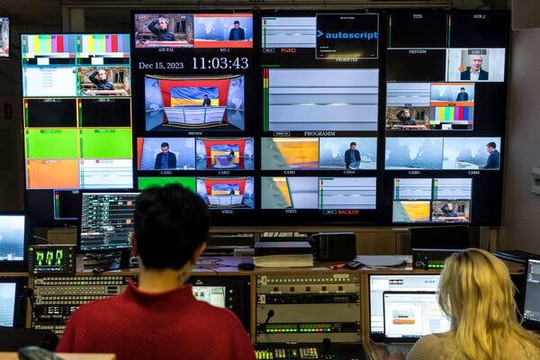Production team members prepare for the broadcast of Ukraine’s television news marathon. Experts see the decline in viewers as a sign of wider disenchantment with the war.
Photo: The New York Times
A government-approved news program intended to counter Russian disinformation and boost morale is coming under criticism for painting a rosy picture of the war. The show, Telemarathon United News, has been a major tool of Ukraine’s information war, praised by the government officials who regularly appear on it for its role in countering Russian disinformation and maintaining morale, writes ‘The New York Times’.
But after nearly two years of war, Ukrainians have grown weary of Telemarathon. What was once seen as a crucial tool for holding the country together is now increasingly derided as little more than a mouthpiece for the government.
Viewers have complained that the program often paints too rosy a picture of the war, hiding worrying developments on the frontline and the West’s eroding support for Ukraine — and ultimately failing to prepare citizens for a long war.
Over time, viewership and trust in Telemarathon have plummeted, which experts see as a sign of wider popular disenchantment with the government, as victory on the battlefield becomes elusive. Many viewers instead spend their time watching popular reality shows and entertainment programs.
“Everyone is fed up with this picture that says, ‘We’re winning, everyone likes us and gives us money,’” said Oksana Romaniuk, the head of the Kyiv-based Institute of Mass Information, a media monitoring organization. “It’s state propaganda.”
Concerns about government influence were also raised after several channels run by political opponents of Mr. Zelensky were barred from joining Telemarathon.
In March 2022, the program accounted for 40 percent of Ukraine’s total viewership, according to Svitlana Ostapa, the deputy chief editor of Detector Media, a Ukrainian media watchdog.
That’s when ratings started to drop.
By the end of 2022, viewership of the news program had shrunk to 14 percent of the television audience, Ms. Ostapa said. Today, it is down to 10 percent.
Many viewers said that as the threat of a Russian takeover receded, the program’s patriotic overtones became increasingly exaggerated. “They portray events in Ukraine as if everything is fine, as if victory is just around the corner,” said Bohdan Chupryna, 20, on a recent evening in Kyiv, the Ukrainian capital.
Like other Ukrainians, Mr. Chupryna said the coverage of Ukraine’s counteroffensive this summer was overly optimistic, giving the impression that the military would quickly push through enemy lines. The counteroffensive faced setbacks from the start and eventually mostly failed.
Another concern is that Telemarathon has transformed into a public relations operation for Mr. Zelensky, who remains Ukraine’s most trusted political figure but has seen his approval ratings decrease in recent months.
Figures compiled by Mr. Kulias show that members of Servant of the People, Mr. Zelensky’s party, accounted for more than 68 percent of the program’s political guests in 2023, with this proportion rising steadily throughout the year. Servant of the People controls half of the seats in Parliament.
“It’s like a unanimous point of view,” Andrii Khantil, a 41-year-old lawyer, said of Telemarathon on a recent evening near the Golden Gate, a reconstructed gateway that marked the entrance to Kyiv in medieval times. “It’s not really what we need. It’s not helpful.”
read more in our Telegram-channel https://t.me/The_International_Affairs

 10:05 07.01.2024 •
10:05 07.01.2024 •























